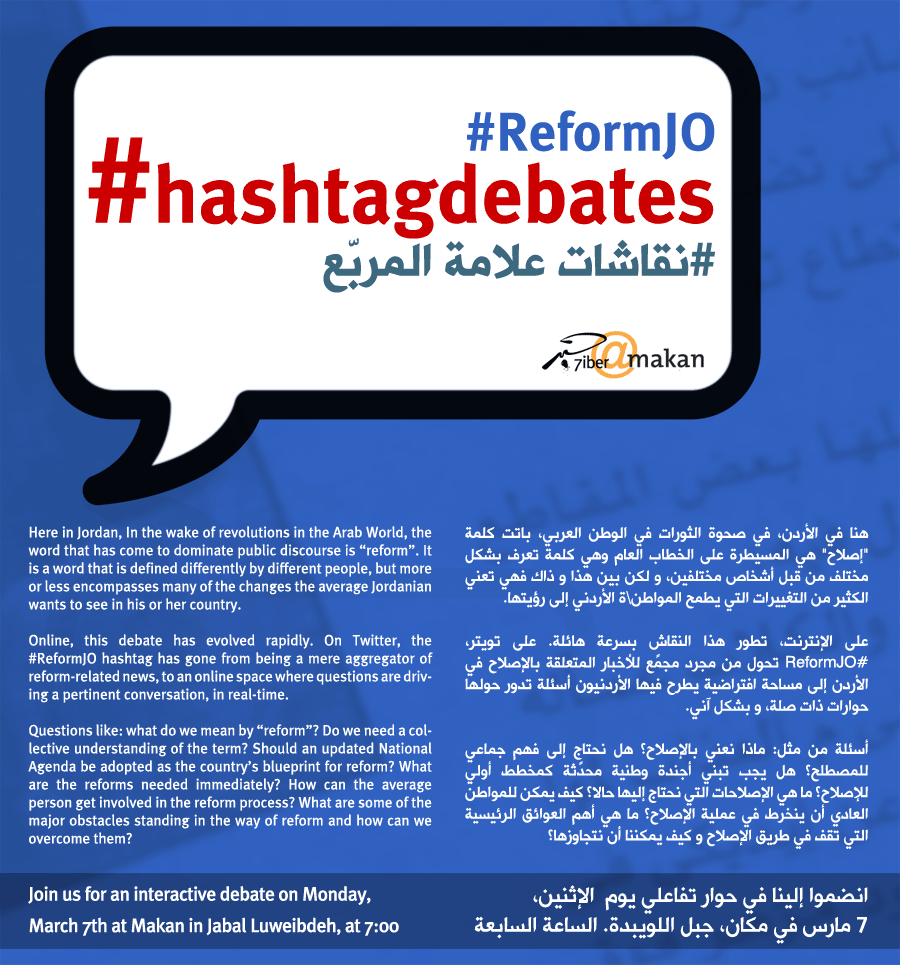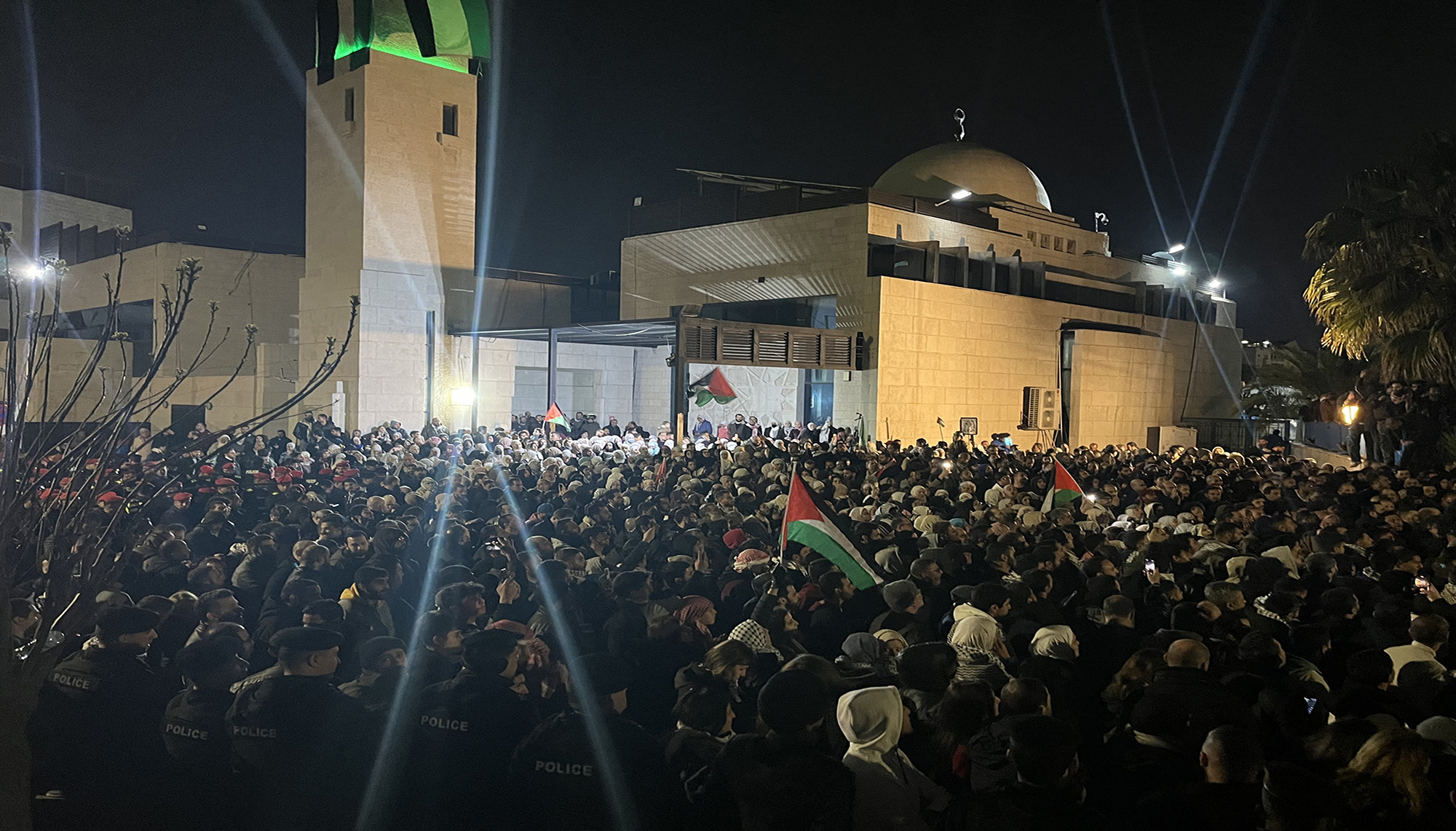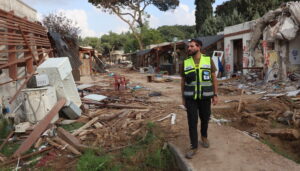في صحوة الثورات التي قادت إلى سقوط النظام في تونس و مصر خلال بضعة أسابيع، تستمر التظاهرات و الحركات التي تبحث عن التغيير السياسي في النمو في المنطقة و بخاصة في دول من مثل ليبيا و البحرين. و بينما تتجلى هذه الانتفاضات بأشكال مختلفة في دول المنطقة، فهي بمثابة الدليل على أن الكثير من الدول العربية لا تعاني فقط من نفس المشاكل كالبطالة و الفقر و الحرمان بل و تتطلع كلها إلى مستقبل أفضل.
هنا في الأردن، خلال المظاهرات الأسبوعية المستمرة…، باتت كلمة “إصلاح” هي المسيطرة على الخطاب العام وهي كلمة تعرف بشكل مختلف من قبل أشخاص مختلفين، و لكن بين هذا و ذاك فهي تعني الكثير من التغييرات التي يطمح المواطنة الأردني إلى رؤيتها.
على الإنترنت، تطورهذا النقاش بسرعة هائلة. على تويتر، #ReformJO تحول من مجرد مجمًع للأخبار المتعلقة بالإصلاح في الأردن إلى مساحة افتراضية يطرح فيها الأردنيون أسئلة تدور حولها حوارات ذات صلة، و بشكل آني.
أسئلة من مثل: ماذا نعني بالإصلاح؟ هل نحناج إلى فهم جماعي للمصطلح؟ هل يجب تبني أجندة وطنية محدًثة كمخطط أولي للإصلاح؟ ما هي الإصلاحات التي نحتاج إليها حالا؟ كيف يمكن للمواطن العادي أن ينخرط في عملية الإصلاح؟ ما هي أهم العوائق الرئيسية التي تقف في طريق الإصلاح و كيف يمكننا أن نتجاوزها؟
في السابع من مارس، سيستضيف حبر حوارا حول هذه الأسئلة، في محاولة لمد النقاش الذي بدأ على الأنترنت إلى أرض الواقع، و تمكين المواطنين من المشاركة في حوار صحي و حيوي.
انضموا إلينا في الساعة السابعة مساء، يوم الإثنين 7 مارس، في مكان – جبل اللويبدة.
In the wake of revolutions that have lead to the downfall of regimes in Tunisia and Egypt within the span of several weeks, protests and movements looking for political change continue to grow in the region, specifically in countries like Libya and Bahrain. While such uprisings are manifesting in various ways throughout the region, they are a testament to the fact that not only do many in the Arab world suffer from the same realities of unemployment, poverty and disenfranchisement, but that they are all looking for a better future.
Here in Jordan, in the midst of ongoing weekly demonstrations,the word that has come to dominate public discourse is “reform”. It is a word that is defined differently by different people, but more or less encompasses many of the changes the average Jordanian wants to see in his or her country.
Online, this debate has evolved rapidly. On Twitter, the #ReformJO hashtag has gone from being a mere aggregator of reform-related news, to an online space where questions are driving a pertinent conversation, in real-time.
Questions like: what do we mean by “reform”? Do we need a collective understanding of the term? Should an updated National Agenda be adopted as the country’s blueprint for reform? What are the reforms needed immediately? How can the average person get involved in the reform process? What are some of the major obstacles standing in the way of reform and how can we overcome them?
On March 7th, 7iber will be hosting a conversation around these questions in an attempt to expand the online discussion offline, and allow citizens to engage in a lively and healthy debate.
Join us on Monday, March 7th at Makan in Jabal Lweibdeh.











